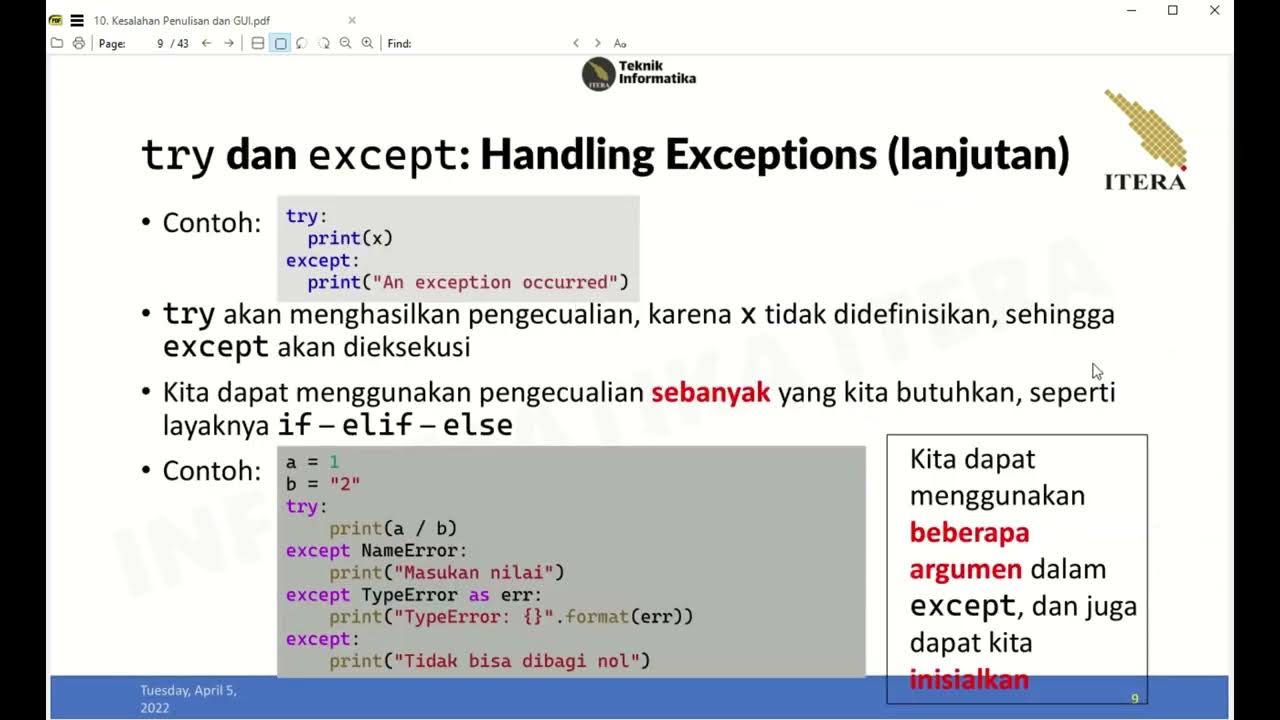Lecture 24: Exception Handling-II
Summary
TLDRThe video discusses exception handling in Java, covering the fundamental concepts of `try-catch` blocks and the importance of managing exceptions effectively. It highlights how exceptions can be thrown and caught, detailing various types of exceptions found in the `java.lang` package. The speaker emphasizes the need for programmers to understand these exceptions and how to create custom exceptions for specific use cases. The session also touches on multiple `catch` blocks for handling different exceptions, with a preview of an upcoming module on defining user-defined exceptions, enhancing error management in programming.
Takeaways
- 😀 Exception handling is crucial in Java to manage errors gracefully.
- 🛠️ The 'try-catch' block is fundamental for handling exceptions.
- 🔍 When an exception is thrown, it can be caught by a corresponding catch block.
- 📈 Multiple catch blocks can be used to handle different types of exceptions efficiently.
- 🚀 Custom exceptions can be created to address specific application needs.
- 🔄 The runtime manager in Java automates the handling of certain exceptions.
- 📋 A clear understanding of the exception classes in the 'java.lang' package is essential for developers.
- 📊 Proper exception handling improves the robustness and reliability of Java applications.
- 🤖 User input validation is vital to prevent exceptions during runtime.
- 🔑 Exception handling promotes better debugging and maintenance practices in software development.
Q & A
What is the main topic discussed in the video?
-The video primarily discusses exception handling in Java, including how exceptions are thrown, caught, and managed.
What is the purpose of a try-catch block in Java?
-A try-catch block is used to handle exceptions in Java by allowing code to attempt execution within the 'try' block and catch any exceptions that may occur in the 'catch' block.
How does the runtime manager relate to exception handling?
-The runtime manager automatically handles exceptions that occur during program execution, ensuring that appropriate actions are taken when exceptions arise.
Can you give an example of when an exception might be thrown?
-An exception might be thrown if a user inputs a value that does not meet specific criteria, such as entering a one-digit number when two digits are required.
What are the different ways to handle exceptions in Java?
-Exceptions can be handled in several ways, including using multiple catch blocks for different exception types or a single catch block for a general exception type.
What is the significance of the 'java.lang' package in relation to exceptions?
-'java.lang' is a fundamental package in Java that contains several predefined exception classes that programmers need to be familiar with to handle exceptions effectively.
What does the speaker imply about user-defined exceptions?
-The speaker implies that users have the ability to define their own exceptions, which can provide more specific error handling tailored to their application needs.
What is the importance of understanding exception handling for programmers?
-Understanding exception handling is crucial for programmers as it allows them to write robust, error-resistant code that can gracefully manage unexpected situations during program execution.
How does the speaker suggest managing exceptions effectively?
-The speaker suggests that there are various methods to manage exceptions, including clearly defining when exceptions should be thrown and ensuring that the relevant catch blocks are in place to handle them.
What is the next topic that will be discussed in the following module?
-The next module will focus on how users can define their own exceptions and manage them within their Java applications.
Outlines

This section is available to paid users only. Please upgrade to access this part.
Upgrade NowMindmap

This section is available to paid users only. Please upgrade to access this part.
Upgrade NowKeywords

This section is available to paid users only. Please upgrade to access this part.
Upgrade NowHighlights

This section is available to paid users only. Please upgrade to access this part.
Upgrade NowTranscripts

This section is available to paid users only. Please upgrade to access this part.
Upgrade NowBrowse More Related Video

Exception pada Pemrograman Berorientasi Objek - Python

70+ Trickiest Core Java Interview Questions and Answers 😱

Exception Handling In C++ | What Is Exception Handling In C++ | C++ Programming | Simplilearn

File Handling in Java | Java program to create a File

How To Create Custom Exceptions In Python

Learn Python EXCEPTION HANDLING in 5 minutes! 🚦
5.0 / 5 (0 votes)